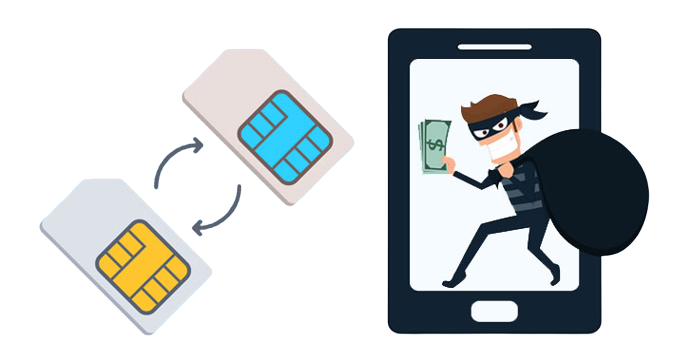 Welcome to the digital age, where our lives are intricately woven into the fabric of technology. We rely on our smartphones for communication, banking, and even accessing sensitive personal information. But what happens when someone gains unauthorized access to your mobile device and takes control of your digital identity? This is where SIM swapping comes into play – a growing threat that has the potential to wreak havoc on your life.
Welcome to the digital age, where our lives are intricately woven into the fabric of technology. We rely on our smartphones for communication, banking, and even accessing sensitive personal information. But what happens when someone gains unauthorized access to your mobile device and takes control of your digital identity? This is where SIM swapping comes into play – a growing threat that has the potential to wreak havoc on your life.
In this blog post, we will delve into the dark world of SIM swapping, exploring its definition, consequences, prevention methods, and how to report such incidents.
So buckle up as we uncover the truth behind this cybercrime phenomenon!
What is Sim Swapping?
 Picture this: you’re going about your day, engrossed in the hustle and bustle of life. Little do you know that a cunning cybercriminal is plotting to steal your digital identity. How? Through a technique known as SIM swapping.
Picture this: you’re going about your day, engrossed in the hustle and bustle of life. Little do you know that a cunning cybercriminal is plotting to steal your digital identity. How? Through a technique known as SIM swapping.
So, what exactly is SIM swapping? It’s a devious method used by hackers to take control of your mobile phone number and subsequently gain access to all associated accounts. By convincing your mobile service provider to transfer your phone number to their own device or SIM card, these criminals effectively hijack your identity.
The process typically begins with the attacker gathering information about you from various sources – social media profiles, public records, or even phishing scams. Armed with intimate knowledge of your personal details, they contact your mobile service provider posing as you – claiming that their old SIM card is damaged or lost and requesting a new one.
Once successful in convincing the unsuspecting customer service representative, the hacker receives the new SIM card or transfers the victim’s existing phone number onto their own device. From there on out, it’s open season for them as they exploit this newfound control over not only calls and messages but also online accounts linked to that mobile number.
SIM swapping has become an increasingly prevalent threat due to its potential for financial gain. Hackers can use this method to bypass two-factor authentication (2FA), intercept SMS verification codes sent by banks and other institutions. They then proceed to drain bank accounts, make unauthorized purchases using credit cards tied to those numbers – leaving victims in utter disbelief and financial turmoil.
This cybercrime isn’t just limited to individuals; businesses are also vulnerable targets. With sensitive corporate information stored on devices tied directly or indirectly through services like cloud storage systems – no organization is immune from falling prey.
Stay tuned as we explore how you can protect yourself against such attacks later in our blog post!
What is the definition of SIM Swapping?
Sim swapping is a term that has been making headlines in recent years, but what exactly does it mean? In simple terms, sim swapping refers to the unauthorized transfer of someone’s mobile phone number from one SIM card to another. This can be done by exploiting vulnerabilities in the mobile network infrastructure or through social engineering tactics.
With access to your phone number, hackers can gain control over your personal accounts and sensitive information. They may use this information for various malicious activities such as identity theft, financial fraud, or even blackmail.
To prevent sim swapping attacks, there are several measures you can take. Make sure to set up a PIN or password with your mobile carrier to secure your account. It’s also advisable not to share any personal information online that could potentially be used against you in a sim swap attack.
If you suspect that you have fallen victim to sim swapping, it is important to report the incident immediately. Contact your mobile carrier and inform them of the situation so they can take appropriate action and help protect your account.
While sim swapping is a serious crime with potentially devastating consequences for victims, there are alternatives available for added security. One such alternative is using two-factor authentication (2FA) methods like authenticator apps or physical security keys rather than relying solely on SMS-based verification codes.
How to prevent SIM Swapping
 SIM Swapping is a growing threat in the digital world, and it’s crucial to take proactive measures to protect yourself from falling victim to this crime. Here are some steps you can take to prevent SIM Swapping:
SIM Swapping is a growing threat in the digital world, and it’s crucial to take proactive measures to protect yourself from falling victim to this crime. Here are some steps you can take to prevent SIM Swapping:
1. Secure your personal information: Be cautious about sharing sensitive details online or with unknown individuals. Avoid posting personal information on social media platforms, as hackers often use this information for SIM Swapping attacks.
2. Use strong, unique passwords: Create complex passwords for all your online accounts and change them regularly. Avoid using common phrases or easily guessable information like birthdays or pet names.
3. Enable two-factor authentication (2FA): Many websites and apps offer 2FA as an extra layer of security. This method requires you to enter a verification code sent via SMS or generated by an authenticator app when logging in.
4. Contact your mobile service provider: Ask your carrier about additional security measures they offer, such as PINs, passcodes, or verbal passwords that must be provided before making any changes to your account.
5. Be vigilant with phishing attempts: Beware of suspicious emails, messages, or calls asking for personal information or login credentials. Always verify the legitimacy of the sender before responding.
6 . Regularly monitor your accounts: Keep a close eye on your financial transactions and mobile service activity for any unauthorized access or unusual behavior.
By following these preventive measures consistently, you can significantly reduce the risk of falling victim to SIM Swapping scams and help keep yourself protected in the digital age
What are the consequences of SIM Swapping?
SIM swapping can have serious consequences for individuals and businesses alike. Once a hacker gains control of someone’s phone number through SIM swapping, they can use it to gain unauthorized access to various accounts and commit fraudulent activities.
One major consequence is financial loss. Hackers can exploit their access to a victim’s accounts to make unauthorized transactions or drain funds from bank accounts. This can leave victims with significant financial hardships and damage their creditworthiness.
Another consequence is identity theft. With control over someone’s phone number, hackers can reset passwords on various online platforms, gaining access to sensitive personal information such as social media profiles, email accounts, and even cryptocurrency wallets. This puts victims’ privacy at risk and leaves them vulnerable to further exploitation.
Additionally, SIM swapping can result in reputational damage for businesses. If a company’s employees fall victim to SIM swapping attacks, confidential corporate data may be compromised leading to breaches that could harm the organization’s reputation and customer trust.
It is important not only for individuals but also for organizations to take proactive measures in preventing SIM swapping attacks by implementing strong security measures like two-factor authentication (2FA), monitoring account activity regularly, and being vigilant about phishing attempts.
The consequences of SIM swapping are far-reaching – from financial loss and identity theft to reputational damage – highlighting the importance of staying informed about this criminal activity and taking necessary precautions against it.
How to report SIM Swapping
 Reporting SIM swapping is crucial in order to protect yourself and others from falling victim to this crime. If you suspect that your SIM card has been swapped without your authorization, there are several steps you can take to report it.
Reporting SIM swapping is crucial in order to protect yourself and others from falling victim to this crime. If you suspect that your SIM card has been swapped without your authorization, there are several steps you can take to report it.
1. Contact your mobile service provider: As soon as you notice any suspicious activity or loss of network connectivity, reach out to your mobile service provider immediately. They will be able to verify if a SIM swap has taken place and help secure your account.
2. File a police report: It’s important to document the incident by filing a police report. Provide them with all the relevant information, such as the date and time when you noticed the issue, any fraudulent activities associated with it, and any evidence you may have gathered.
3. Report it to the Federal Trade Commission (FTC): The FTC serves as a central hub for reporting various types of identity theft-related crimes, including SIM swapping. Visit their website or call their toll-free number to file a complaint.
4. Inform other relevant institutions: Notify your bank, credit card companies, online platforms, and any other accounts linked to your phone number about the incident so they can take additional security measures.
Remember that prompt action is essential when reporting SIM swapping incidents in order to minimize potential damage and prevent further unauthorized access. By taking these steps, you contribute not only towards protecting yourself but also towards raising awareness about this type of cybercrime.
Alternatives to SIM Swapping
While SIM swapping has become a prevalent method for criminals to gain unauthorized access to personal information and accounts, it’s important to remember that there are alternatives available that can enhance your security. Here are a few options worth considering:
1. Two-Factor Authentication (2FA): This is a widely-used security measure that adds an extra layer of protection to your accounts. With 2FA enabled, you’ll need to provide not just your password but also a secondary form of verification such as a unique code sent via SMS or generated by an authenticator app.
2. Biometric Authentication: Many smartphones now come equipped with fingerprint scanners or facial recognition technology. By enabling these features on your device, you can make it more difficult for others to gain access without your consent.
3. Virtual Private Networks (VPNs): Using a VPN can help secure your internet connection by encrypting data and masking your IP address. This makes it harder for hackers to intercept sensitive information when accessing public Wi-Fi networks or browsing online.
VPN for Sim Swapping
HideIPVPN offers a VPN service with military-grade encryption, and high-speed servers with unlimited bandwidth.
Our service comes with shared IP addresses so that your activity can never be tied to one particular user, further protecting your privacy.

We also offer DNS leak protection, a Kill Switch, the latest VPN protocols, and a guaranteed no-log policy.
Best VPN Deal! Get HideIPVPN for $2.7/mo!
Every purchase you make comes with a 30-day money-back guarantee.
4. Password Managers: Implementing strong, unique passwords across all of your accounts is crucial. However, remembering them all can be challenging. A password manager securely stores and generates complex passwords for each site you use.
5. Encryption: Encrypting sensitive files and messages ensures they remain unreadable even if intercepted by unauthorized individuals.
By adopting these alternative measures, you can significantly reduce the risk of falling victim to SIM swapping attacks while safeguarding both personal and financial information from malicious actors.
Conclusion
Sim swapping is a serious crime that can have devastating consequences for its victims. By gaining control of someone’s phone number, hackers can access personal information, steal identities, and carry out fraudulent activities. It is essential to take steps to protect yourself from sim swapping attacks.
To prevent sim swapping, be vigilant about the security of your mobile devices and accounts. Use strong passwords and enable two-factor authentication whenever possible. Regularly monitor your financial statements and be on the lookout for any suspicious activity.
If you suspect that you have fallen victim to sim swapping or any other form of cybercrime, it is crucial to report it immediately. Contact your mobile service provider, local law enforcement agencies, as well as organizations such as the Federal Trade Commission (FTC) or Internet Crime Complaint Center (IC3).
While sim swapping may seem like an effective method for criminals to gain unauthorized access to sensitive information, there are alternatives available that offer greater security. For example, using more secure forms of authentication such as biometrics or hardware tokens can significantly reduce the risk of falling victim to this type of attack.
In today’s digital age where our lives are increasingly intertwined with technology, protecting ourselves from cyber threats has become a necessity. By staying informed about potential risks like sim swapping and taking proactive measures to safeguard our personal information, we can help ensure a safer online environment for everyone.
Remember: Knowledge is power when it comes to cybersecurity. Stay educated and stay safe!



